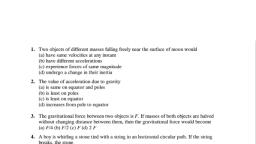Question 2 :
Buoyant force experienced by a solid is _____ the weight of the fluid displaced by it
Question 4 :
When an object falls freely to the earth, the gravitational force acting on the body
Question 5 :
As the density of a series of liquids increases, the upthrust on the iron rod submerged ________.
Question 6 :
If the density of a metal is 8.2 g/cc, its relative density is.
Question 7 :
The R.D. of a metal block is $2.7 \times {10}^{3} {kg}/{{m}^{3}}$. It is immersed in water. State the situation.
Question 8 :
Any solid will not sink in water if its relative density is
Question 9 :
A man is standing on a weighing machine placed in a lift. When stationary, his weight is recordedas $40\ kg$. If the lift is accelerated upward with an acceleration of $2\ m/s^{2}$,then the weight recorded inthe machine will be $g = 10\ m/s^{2}$.<br>
Question 10 :
Acceleration due to gravity of a body during free fall does not depend upon the:
Question 11 :
State whether true or false:The deeper an underwater swimmer goes, the more strongly the water pushes on his body and the greater is the pressure that he experiences.<br/>
Question 12 :
The unit of relative density is $M^{x} L^{y} T^{z}$ . Find x+y+z.
Question 13 :
State whether given statement is True or False<br/>Because the buoyant force acts in a direction opposite the force of gravity, the net force acting on an object submerged in a fluid, such as water, is smaller than the object's weight.<br/>
Question 14 :
The direction of weight of an object is in .............. direction.
Question 15 :
The apparent weight of a body, weighing M kg-wt, during free fall is
Question 16 :
Which of the following is not an application of Archimedes principle :
Question 17 :
A body of mass $3.5kg$ displaces $1000cm^3$ of water when fully immersed inside it. (take $g=10 m s^{-2}$). The volume of the body is $ X\times 10^{3} cm^{3}$. Find $ X.$
Question 19 :
When an object moves with a constant acceleration, under the influence of force of gravitation of the earth only, the object is said to have:
Question 20 :
Where is the intensity of the gravitational field of the earth maximum?
Question 22 :
Assertion: A man is sitting in a boat which is floating on a pond. If the man drinks some water from the pond, the level of water in the pond decreases.
Reason: The volume of water in the pond decreases.
Question 23 :
The mass of an wooden cube of edge 10 cm is 800 g. If the mass of an equal volume of water is 1 kg, then find the relative density of a wooden cube.<br>
Question 26 :
Weight of a body is a scalar quantity. True or false.
Question 27 :
If $g = 10 m{s}^{-2}$, what is the force of gravity acting on a mass of $1 kg$ ?
Question 28 :
The weight of an object in air is $25 N$ and the weight of that object when submerged in water is $20 N$? What is the relative density of the object? 
Question 29 :
How much would a W kg man weigh on the moon in terms of gravitational units?<br>
Question 30 :
_______ of a body changes from place to place but its ______ remains constant.
Question 31 :
A body of mass $5\ kg$ is taken into space. Its mass:<br/>
Question 32 :
Any solid will float in water if its relative density is :
Question 33 :
The maximum vertical distance through which a full dressed astronaut can jump on the earth is 0.5 m. Estimate the maximum vertical distance through which he can jump on the moon, which has a mean density 2/3 rd that of the earth and radius one quarter that of the earth.
Question 38 :
State whether true or false.<br/>The value of the weight of a body varies from planet to planet.
Question 39 :
Assertion: Specific gravity of a fluid is a dimensionless quantity.
Reason: It is the ratio of density of fluid to the density of water.
Question 41 :
Assuming a person could survive in all of the following locations, where would this person have the most mass?
Question 42 :
If W be the weight of the body and U be the upthrust force oft he liquid on the body then what happens if W=U<br>
Question 43 :
A rectangular iron block is placed over a table in different ways such that different faces touch the table. In all these cases, which of the following can be concluded?
Question 46 :
The __________ of an object does not change from place to place.
Question 48 :
The weight of a body on the surface of the moon is $\dfrac {1}{6}th$ of that on the earth's surface. It is because acceleration due to gravity on the surface of the moon is six times that on the surface of the earth.
Question 49 :
Name the force acting on a plastic bucket containingwater held above ground level in your hand. <br>
Question 50 :
<br>If the densities are equal then what is the relative density?

































































